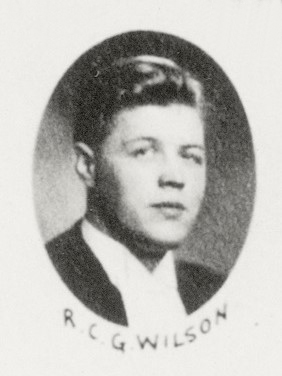
On the Occasion of Remembrance Day
Originally published in the Fall 1945 issue of Obiter Dicta (Vol. 19.1), this was the cover story, announcing the end of World War 2. Attributed to “R. Wilson,” this article came from a future Queen’s Counsel, who just returned from service with the Navy. Mr. Wilson passed away April 30, 1979. At the time of Publication, Robert M. Sedgewick was the Editor, and R. Fraser Elliott was the business manager. Mr. Sedgewick became a founding member of Miller, Thomson, Hicks & Sedgewick in 1957 — now Miller Thomson LLP. Mr. Elliott went on to found Stikeman Elliott in 1952.
In republishing this letter during the recruitment process and in the week before Remembrance Day, our editors wish to draw attention to the sacrifice of previous graduating classes. At this time of year, decades ago, veterans grappled with their own return to school and recruitment into the legal profession.
A Letter to the Editor:
In view of the welcome given us by the Dean and the Vice-Chairman of the Legal Education Committee and, the unprecedented consideration and leniency shown in many instances by the Legal Education Committee, Convocation, The Faculty, the Secretary and his hard pressed staff by their actions and words it is only fair and, in order, that some of us service personnel in the First Year should in turn express our sincere appreciation and thanks for all that has been done on our behalf.
We are all very much aware of the extent to which many visible matters have been handled to our advantage. We note the size of the class who are from the services representing almost every rank and rating to be found in the Navy, Army, Air-force and Merchant Marine. Amongst us can be found representatives from every war theatre and campaign. As yet there have been no restrictions enforced concerning enrolment. Thus giving all possible a fair chance to get in and, down to business, even though to the faculty this class must seem much like a “wet blanket” in size, compared to all previous classes. Despite all this we have heard no complaints. Every effort has also been made to assist fellows get offices by the Secretary and staff.
For some the decision to take this course has been made while on duty overseas, for others of us it has been a lifelong ambition; today this determination is a reality. How many of this original group will complete the course is only for time and circumstance to tell.
The war is now behind us, ranks, ratings and services will no longer mean a thing: we all toe the same starting line, we’ll all start together down the same track with the same objective as the finishing point. One handicap which might exist for some is the “deafening quietness” and inactivity of the lecture room when compared to the activity and tension of overseas or operational duty. But ‘this is hardly a matter for consideration, instead it is something for the individual to master or throw off as the course progresses and his interest grows.
We of the services owe it to Convocation, The Legal Education Committee, The Faculty, the Administrative Staff and above all, to ourselves, to get down to this business of Law . . . and at the same time give a good account of ouselves [sic]. We do not expect certainly, we should not ask for any extra consideration because of service in the armed forces. We entered the various services at our own request and we are all here today as a result of our own will. While on duty we expected the best that the enemy had to offer and, we might say that we have hardly been disappointed. While we do not class the Faculty as foes, they are in some sense, ‘on the other side of the fence’: and we trust that we shall get the best (and the worst at exam time?) that they can professionally offer to us. Here too, we must be prepared for the consequences.
To the rest of the student body we might say as one that we expect and look forward to your keen competition in study and your strong fraternal spirit at all times; although after the years of barrack and ship life we cannot but feel the conspicuous absence of a ‘Frat house’. But, perhaps this class in the future months or years may be the instrument or means to remedy this situation. The least that we can do is to try.
It is only too obvious that the sudden cessation of the Pacific and East Asia campaigns, which in turn resulted in a last minute rush of registration has, and will continue for a while to cause much inconvenience to the faculty and staff. But we all hope that this inconvenience will be borne as a tribute to those fellows who would be here today, but for the large demands and supreme sacrifice that has been theirs in the operations overseas for this country. All of us should remember that any inconvenience that we may suffer is so negligible when compared to the supreme sacrifice of but one Canadian for this country.
We are also well aware of the honour and tradition which is associated with ‘Osgoode Hall’. I trust that none of us will underestimate it but rather add to it to the same extent as many have done in these past few years to the glory and tradition of a ship, a regiment or squadron.
R. WILSON
The Editors express their thanks to Teodora Naydenova and Craig Butosi, of Osgoode’s Library, for their assistance in accessing this archived content. Students are welcome to access the Obiter archives through the library. The majority of content is available in the stacks, with some early content available only through Special Collections (by appointment).
